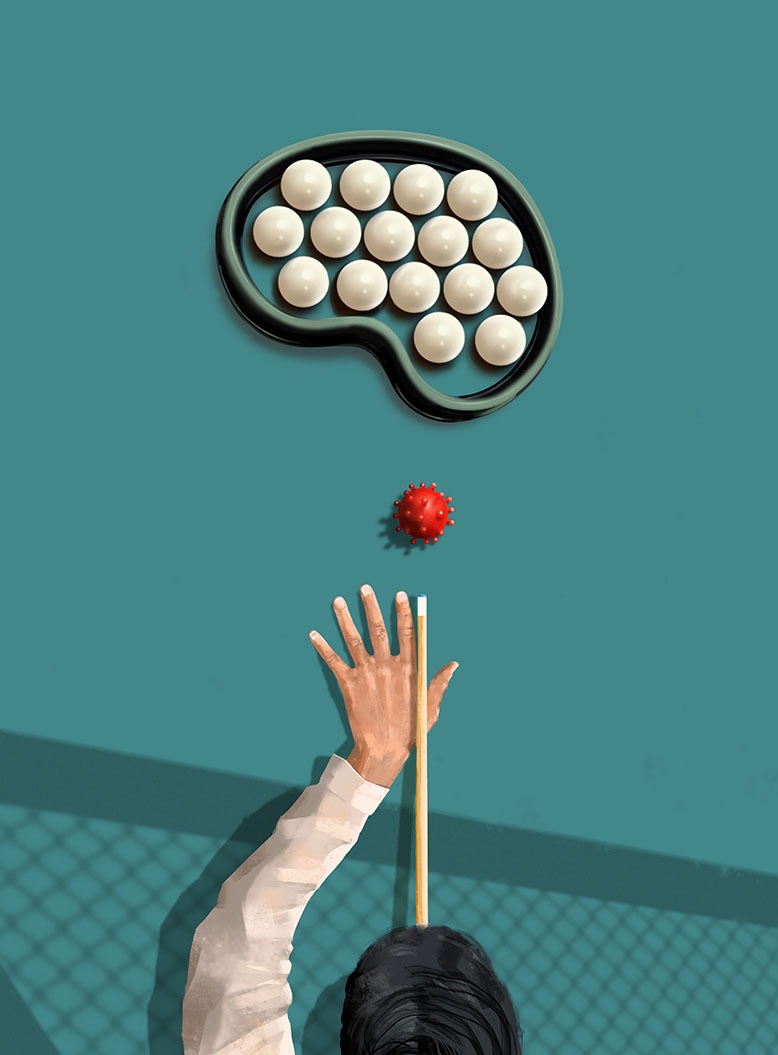
Illustration by Raul Arias
After battling Covid-19 for several weeks, Jennifer Carpinteri, 47, was released from Chilton Medical Center in April 2020. More than two years later, the Wayne resident is still feeling the effects of the virus.
In addition to lingering physical problems, including breathing issues, trouble walking and migraines, Carpinteri, a manager at Atlantic Behavioral Health Community Services, also has anxiety and is contemplating seeking mental health therapy. “The Covid migraine is unlike any other one you have ever had. They are intense and debilitating, and anyone who has experienced them will know what I’m saying,” says Carpinteri.
After more than two years, a neurologist helped Carpinteri find a medication that reduced the frequency of her migraines from daily to a few a month. “I struggle with accepting the fact that I have chronic illness. There are good days and bad days,” says Carpinteri, who lost her mother-in-law to Covid-19.
In 2020, East Orange’s Helen Foster, 48, spent three weeks at St. Barnabas in Livingston with Covid-19 and is now dealing with anxiety and depression. “I’m still wrapping my head around it, still trying to process,” says Foster, whose father died from the virus.
Carpinteri and Foster aren’t alone. Numerous studies show that Covid-19 survivors are at an elevated risk for developing behavioral health problems.

Buy our November 2022 issue here. Cover photo by Brad Trent
According to an April 2021 study published in Lancet Psychiatry, Covid-19 survivors were found to be at increased risk of developing mental-health issues, including anxiety, depression, substance use, sleep disorders and cognitive decline.
An August 2022 study in the same journal suggested the risks of other diagnoses (notably, mood and anxiety disorders) reportedly subsided early and showed no overall excess over the two-year follow-up.
However, the study found there was an elevated risk of neurological and psychiatric disorders two years after a Covid-19 diagnosis. They include cognitive deficit, dementia, psychotic disorder, epilepsy and seizures.
In February the British Medical Journal (BMJ) reported that people who survived the acute phase of Covid-19 were at increased risk for an array of mental health disorders.
While the public has been informed about the physical effects of SARS-CoV-2 infection, which causes Covid-19, the impact of the disease on mental health has not been studied at length, according to data from the National Institute of Health.
“It is certainly consistent with what I’ve seen in my position at HUMC, from other surveys, and what I know is going on with colleagues around the country,” says Dr. Gary Small, chair of psychiatry at Hackensack University Medical Center. “We see an upswing in mental health problems and we always want to ask what’s causing it. We have all been experiencing first-hand stress, anxiety, and overwhelming challenges because of this pandemic,” says Small.
“We are seeing psychiatric symptoms including anxiety, depression, post traumatic symptoms and brain fog,” says Dr. Peter Bolo, chair of the Department of Psychiatry at Atlantic Health System’s Overlook Medical Center.

Illustration: Shutterstock/Mary Long
There has also been an uptick in individuals seeking psychiatric care, says Debra Wentz, PhD, president and CEO of the New Jersey Association of Mental Health and Addiction Agencies.
“Many health and behavioral-health workers, including some of our members, have been impacted by Covid-19. They developed mental health issues that they didn’t have before getting Covid-19. They experienced feelings of depression and anxiety, and substance-abuse disorders increased,” says Wentz. She also points out that many patients and staff struggled with managing depression when they were in quarantine.
“Isolation is detrimental for anyone, and it can be incredibly dangerous and have long-lasting, debilitating effects for people dealing with substance-abuse disorders and mental health issues,” says Wentz.
Theresa C. Wilson, president and CEO of South Jersey Behavioral Health Resources Inc. and executive vice president of Inperium New Jersey, has observed an increase in mental health issues among Covid-19 survivors. “We see that both in the individuals that we serve, our staff and related individuals. We are seeing a lot of anxiety—how it impacts their family, certainly their children, their jobs, their plans.”
Karen Koch-Ramirez, director of Integrated Behavioral Health Services, in Orange, says that she is seeing increased anxiety and patients concerned about getting Covid-19 again.
“Some people have lost their jobs, and they have had family members who have had Covid-19 and lost their jobs. We are seeing the economic impact that it has had on the family. One client was on a ventilator for several weeks, and she still has periodic episodes of difficulty breathing, which increases that anxiety,” says Koch-Ramirez.
Meanwhile, a study in the BMJ shows that Covid-19 disproportionately harms children’s mental health.
According to the study, from April to September 2021 there was an 81 percent increase in referrals for children and young people’s mental health services compared with the same period in 2019. The increase for adults age 19 and up in the same period was 11 percent.
Mental health professionals who work in school-based behavioral-health programs deal with the issue of Covid-19 in a unique way.
“Covid-19 has impacted our society dramatically, and that impact is felt hugely in the school system,” says Jacques Hryshko, chief executive officer of Family Connections, in East Orange. “The schools were shut down for so long, and that has had an impact on the emotional health of the students.”
Rishannabel Ubiera, a school clinician based in Orange, says she is seeing students who had parents and caregivers with Covid-19, some on ventilators or hospitalized for a significant amount of time. “What I’m seeing in our children here is that a lot of them are having anxiety and are worried about the future because of their experience with their parents [and] grandparents having Covid-19.”
SUBSTANCE ABUSE
In New Jersey and nationwide, there has been an increase in substance abuse during the pandemic.
“Alcohol is big, along with marijuana, and the opioid epidemic continues to rage on,” says Bolo, adding that the incidence of overdose deaths across the country continue to escalate and is attributed to fentanyl, a more potent and dangerous substance that some seek for a more profound opiate intoxication.
“More people are taking antidepressants, anti-anxiety medications due to pandemic-related concerns, including trauma and the isolation,” says Wentz. “There have been workforce challenges triggered by the pandemic.”
She adds that there has been an influx of people seeking substance-abuse treatment because of the loss of employment, and isolation.
SCHIZOPHRENIA LINK
In a study published in JAMA Psychiatry, of adults with SARS-CoV-2-positive test results in a large New York medical system, adults with a schizophrenia-spectrum disorder diagnosis had an increased risk for mortality, and it was speculated that such disorders may be risk factors for mortality in some patients with Covid-19.
“Having schizophrenia was one of the most significant risk factors for dying from Covid-19, second only to age. As a group, people with schizophrenia are 2.7 times more likely to die from Covid-19 than those without schizophrenia,” says Wentz.
There are several factors that could put people with schizophrenia at increased risk of dying from Covid-19. These include living in crowded settings, such as group homes, lack of protective equipment, and poor access to health care.
According to industry experts, those individuals are more likely to have underlying medical conditions such as cardiovascular and metabolic disorders, as well as poor nutrition and sleep apnea. Researchers say patients with schizophrenia have an underlying immune-system dysfunction, which can cause complications that make it harder for the body to fight off infection.
Mental health professionals recommend that people who have schizophrenia take precautions such as wearing masks, avoiding crowded indoor settings, and getting vaccinated.
WHAT’S BEING DONE
In July, the Rutgers University Behavioral Health Care Call Center was selected to serve as one of 12 backup centers in the country that will triage overflow calls made to 988, a new national hotline for mental health crisis and suicide prevention.
“We have specific treatments for these and other mental health problems using medications and psychotherapy. In general, we need to encourage people to get back to social settings in safe ways to help them overcome any social phobias they might be developing because of the pandemic,” says Small.
“One model is collaborative care, and we have been involved in this approach for children and adolescents. In this model, behavioral-health experts consult directly with primary care practices and help the pediatrician deal with the more common mental-health conditions, while providing more assistance with the complex ones,” says Small.
Wentz says that, as more people were affected by Covid-19, the greater the awareness of mental illness became. Although great strides have been made, she says, there is still a great deal of work that must be done to fight the stigma and discrimination.
“What’s really needed is self-care and support of the workforce,” Wentz says.
Hryshko notes that it is emotionally more difficult for someone to walk into a clinician’s office to seek mental health services than it is to walk into a general practitioner’s office. But in the last two years, he says, there has been a much greater recognition and appreciation of what mental health services can provide.
Ubiera says evidence-based practices have been very successful in providing patients with coping skills and tools they can use outside of sessions. “What I’m doing in a session is: I’m teaching them how to use that skill at home on their own, because my goal is to give them tools they can incorporate into their daily lives and continue to use even when they are done with their therapy with me. I check in with them to see how things are progressing.”
SELF-CARE STEPS
Wilson says that it’s important to talk about what you are doing to take care of yourself, to reduce anxiety, and to not feel a sense of stigma if you need help.
“Whether it’s professional [or] whether you need to vent to a family member or colleague, it’s important to focus on your physical and mental health. We need to go back to our doctors. We need to feel okay about going to a counselor and to [being] able to help yourself, as well as your support network, those individuals that are around you, your family and colleagues,” says Wilson.
Anthony Vecchione is a health and medical journalist based in Bergen County.
No one knows New Jersey like we do. Sign up for one (or more!) of our newsletters to get the best of where we live sent to your inbox every week. Want a print magazine mailed to your home? Purchase an issue from our online store.



